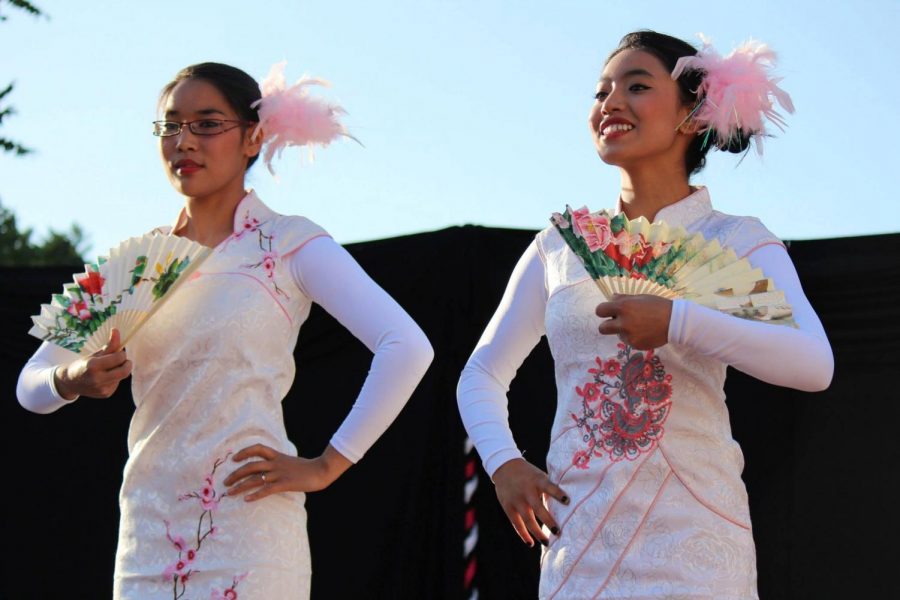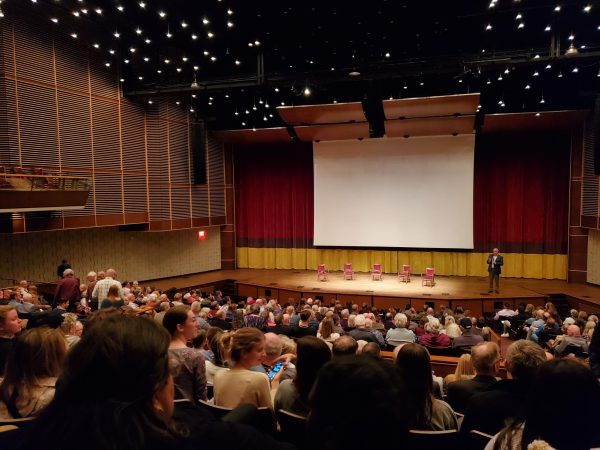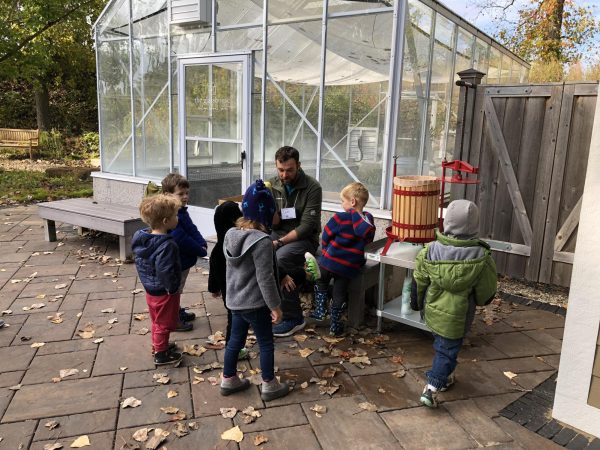Afghan student talks childhood in conflict, hopes for justice
Mujiza Kinaaz* still watches over her shoulder in church, looking for secret police that aren’t there. It’s a habit she picked up in her home country of Afghanistan where converting to Christianity can mean death. Although the Calvin sophomore has made strides in the last six years battling trauma gained from persecution, staying present in Michigan classrooms and sanctuaries while her family is roughly 7,000 miles away is a struggle.
From the safety of the US, heartache persists from Kinaaz’s life in Afghanistan. She has not spoken to her mother in years. She knows that her mother continually changes her cell phone number but worries that calling her would endanger her life. She also worries that her mom won’t be there to answer. “I am also like really scared that I find the right number, and I call her, but she doesn’t come [to] pick up the phone ‘cause something happened to her,” she said.
Although she was born in Herat, the province that borders Iran, Kinaaz moved so much as a child that she feels like she has multiple hometowns. Some were nicer than others, located near a city with stores and good public transportation. In others, her family had leaky roofs and no heat, and they struggled to survive the winters. “We would eat moldy bread and snow and the same food we fed our sheep at times,” she said.
Shepherding was the responsibility of children in Afghanistan, so Kinaaz brought her family’s flock out to the mountains and learned to recognize explosives, Soviet or Taliban landmines leftover from dozens of years of conflict in the country.Her family moved to Kabul when she was a toddler, where she and her siblings entered a public school in the city. Kinaaz was 14 years younger than anyone else in the school.
As Hazaras, an ethnic minority that is more progressive than most of Afghan society and traces their lineage to Mongolian invaders, they were subjected to harassment and abuse from teachers and other students; the former of which would beat her knuckles bruised and bloody with metal rulers and electrical wires, for no reason. According to Kinaaz, because her appearance looks Mongolian and she speaks a different dialect, there was no hiding her minority status.
Kinaaz switched schools in third grade and started studying at a private international school. The first two years were funded by Blackwater, a private military firm currently under investigation, founder Erik Prince (who is also the brother of secretary of education Betsy DeVos); however, she paid for the rest of her tuition through other scholarships and working. Most of her teachers were American, but her classmates were the children of government officials. These private school classmates continued the bullying that she had experienced at the public school against her and the four or five other Hazara students.
Women used to be able to move around freely in Afghanistan, without needing to cover their entire body. However, years of war, uncertainty and extremist regimes have brought about a culture hostile to women. “Growing up there makes you feel like being a woman is unacceptable and that you should be anything but a woman,” she said. “I thought the only way to take care of my family was to look like a guy, was to be a guy.”
According to Kinaaz, classmates called her an infidel for playing soccer. In the streets, men would assault her, touching her chest and body despite being totally covered up. The harassment would take place daily and be so severe that it stopped her at some points from going out for any other reason than school and work. Men would tell her as a child that she needed to cover her hair and wrists. “There were times where I would, you know, go to the grocery store, and then I would come back with like bruises on my hand from fighting with all these guys,” she said.
Around fourth grade, her mom started signing up Kinaaz and her siblings for martial arts courses and gave them chains and knives for self-defense. This caution was necessary, as Kinaaz was not just a woman or Hazara but also Christian. Her sister started attending underground churches after moving to Kabul, and roughly half of Kinaaz’s family of eight became Christian; the other half remained Shia Muslims (most Afghans are Sunni; Hazaras are largely Shia.) When she was five years old, Kinaaz came to a service and was mesmerized by the stories she heard of Jesus, who she thought was an American at that time. “I was like, ‘Oh my gosh, what happens if you request for him to come here and like fix this and get rid of poverty, and all discrimination and persecution?’” she said.
However, the blend of Christianity and Islam in the household created problems. After receiving a picture Bible, her oldest brother and sister took it, ripped it up and burned it, forbidding her from reading this book ever again. Kinaaz was confused; she just enjoyed the pictures, but she hid every Bible she ever had afterwards. The main threat came from outside her family. If the police caught them with a Bible, they would be hanged. Neighbors and relatives started finding out and would break into their home. “At that point, we had no one on our side,” she said. “We couldn’t go to the police.”
When Kinaaz was about seven years old, her underground church experienced a surge in membership. However, these were spies, not converts, and shortly thereafter, a video recording of the Kinaaz family worshipping was leaked to state TV. The impact was devastating. According to Kinaaz, many members were burned alive, were stabbed or took their own lives to avoid capture. According to Kinaaz, her own brother was kidnapped and beaten, but he miraculously returned alive. There were no shortage of miracles following her conversion; Kinaaz recounted an instantaneous healing of asthma and her family members surviving numerous explosions that were close enough to shatter their windows. Kinaaz felt like her faith was a direct connection to God which sustained her.
In the background of all this, American soldiers were in Kabul during her childhood. She felt conflicted about their presence, grateful it was safe enough for her to go to school but worried about the “dirty work” going on, specifically by firms like Blackwater. However, according to Kinaaz, the American forces killed innocents, many of them children. The children of Kabul grew up around guns and warfare and would point finger guns at one another while playing. American troops would shoot and kill these children if they did so within ten feet of their tanks. Kinaaz lost friends she played with in the street. “It caused a lot of families heartache and a lot of confusion, because [these families] thought [the American soldiers] were there to help,” she said.
A new challenge arose during eighth grade after her school was forced to close. Before, there had been lockdowns almost weekly, and terrorists had already blown off a wall with a rocket in 2005. The security guards weren’t enough in the face of constant threats. Kinaaz described one day where the school was caught in the crosshairs of the Taliban and Afghan forces. After hiding under desks, they were evacuated home, where Kinaaz and family still were stuck in between the fighting. She could not even use the restroom during the two-day long fighting. Their Christmas break was extended and extended until spring break, when it was announced that the school would close.
Kinaaz did not want her education to end. She went to internet cafes and applied to numerous American boarding schools. Eventually, the Brook Hill School, a Christian K-12 boarding school in east Texas, accepted her. However, she, her parents and youngest brother fled to India at the time. The school persisted in asking her to attend, so she got a student visa from the American embassy in India. From there, she flew to the US.
“That decision killed me,” she said. “It still hurts. I still feel guilty about it.”
Kinaaz and her siblings provided for the family. Since she was in third grade, she worked three jobs, tutoring, teaching dance classes and acting as a teacher’s assistant. Her father was paralyzed, unable to bathe or feed himself after suffering extreme torture. As a woman, her mother could only work cleaning people’s floors, a job that brought only $2-8 a month home. She felt selfish, leaving her family. Her family left that same month to Kabul, the same month ISIS took over. The terrorist group kidnapped her brother and forced him to convert to Islam. Her dad died not too long after, just hours before she called home.
The transition was difficult. Although teachers and her classmates’ parents were supportive of her, Kinaaz felt alienated from her peers and their interests in Texas; their worrying about popularity felt irrelevant. She carried her guilt and trauma from her life in Afghanistan. “I still hadn’t accepted that I had left my family,” she said. “I just wasn’t present here. I was still at home with everything that was going on.”
She transferred to Innovation Central in Grand Rapids during her junior year and then to Grand Rapids Christian High School for her senior year. Adapting to American culture still proved difficult, and she needed years of therapy to deal with post-traumatic stress. “I didn’t know how to be normal or how to have fun,” she said.
Her host family took her to Madison Square Church, where she first became connected to the Calvin community. Although she now enjoys Calvin, during the application process she hated the school for how frustrating it was. Calvin Admissions did not list Afghanistan as a potential home country and tried to have Kinaaz apply under another. At first, Kinaaz was going to comply but then refused to apply until Calvin listed Afghanistan on the website. “With the amount of stress I went through, I didn’t want to give up in getting into Calvin,” she said.
Despite getting accepted into Michigan State University and other schools, Kinaaz wasn’t accepted to Calvin until well after May 1.
Kinaaz was determined. “I wanted to be the first Afghan here, and I wanted to pave the way for other Afghan students,” she said.
Now studying international relations and strategic communications, she says she’s grown to love Calvin and now uses her voice for social justice. Kinaaz is already a member of the International Youth Congress and recently spoke about her childhood at a panel discussion on the war in Afghanistan in the DeVos Communications Building. She plans to write a book in the next year, and a documentary is being made on her life by both a media class and the International Congress of Youth Voices.
Additionally, Kinaaz receives threats on social media. Strangers will tell her that her head should be cut off because she’s attending school in the West and that she’s a prostitute for going to school with men. She has had to stay off social media. Despite this, she is motivated not by fear. She said, “I decided to make that my mission statement and be a changemaker and fight for justice for those who can’t raise their voices.”
*Mujiza Kinaaz is a pseudonym used to protect Kinaaz and her family.









